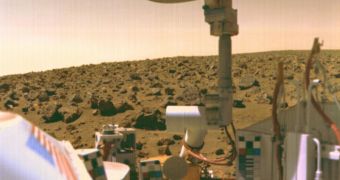New data seems to support the hypothesis which states that traces of organic building blocks may exist in the Martian soil, despite data provided by the Viking missions to the contrary.
According to the investigation, it would appear that the landers may have had a negative influence on the areas where they touched down, in the sense that they may have destroyed the very evidence they were sent there to discover.
The missions arrived at Mars some 34 years ago, and experts now believe that the equipment the probes had at the time did not allow them to recognize organic compounds.
These chemicals are essential for carbon-based life forms such as ourselves, and every other creature on Earth. Given t Mars may have been covered by liquid water in the past, it stands to reason that life forms may have developed as well.
If that is the case, the reasoning goes, then spacecraft outfitted with special detectors could discover such molecules. Bu the Viking landers sent on Mars in 1976 failed to do so.
Researchers argue in the new investigation that this isn't by far evidence that life never existed in Mars. The paper argues that instrumentation on the landers may have been at fault here.
If this indeed turns out to be the case, then this could have significant implications on how we view the Red Planet. The Viking data is one of the main reasons why Mars is now thought off as a place which can hardly support life.
One of the coauthors of the new paper, National Autonomous University of Mexico in Mexico City expert Rafael Navarro-González, says that the research should inspire the development of new strategies of searching for life on the planet.
Some of the expert's collaborators include NASA Ames Research Center scientist Chris McKay. The two will publish their work in an upcoming issue of the esteemed scientific Journal of Geophysical Research–Planets.
“The bottom line of this work is that the Viking landers did detect organics on Mars, we just did not realize it,” McKay writes in the paper.
The experts say that the NASA Curiosity rover (also known as the Mars Science Laboratory) will have the ability to analyze soil samples with instrument capable of detecting organic molecules.
The robot may therefore be in a position to finally confirm or infirm the Viking discoveries. The instruments that will go on Curiosity will be the best ones we've got, Science News reports.
“I’m very excited about the possibility that in a couple years, we will have a follow-up mission that will use the information that comes from this study to detect and confirm the organics on Mars,” McKay concludes.

 14 DAY TRIAL //
14 DAY TRIAL //